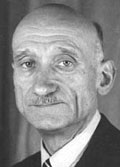 |
Jean-Baptiste Nicolas Robert Schuman
b. 29 Jun 1886, Clausen/Luxembourg City, Luxembourg
d. 4 Sep 1963, Scy-Chazelles, Moselle, France |
| Title: |
Président du Conseil des ministres (President of the Council of Ministers) |
| Term: |
24 Nov 1947 - 24 Jul 1948 |
| Chronology: |
22 Nov 1947,
endorsed by the vote of investiture, session of the Assemblée nationale (National Assembly), Palais-Bourbon, Paris [1] |
|
24 Nov 1947,
appointed on the list of members of the Council of Ministers, decree of the President of the Republic [2] |
|
24 Jul 1948,
ceased to exercise the functions of office upon the appointment of a successor [3] |
| Term: |
2 Sep 1948 - 11 Sep 1948 |
| Chronology: |
31 Aug 1948,
endorsed by the vote of investiture, session of the Assemblée nationale (National Assembly), Palais-Bourbon, Paris [4] |
|
2 Sep 1948,
appointed, decree of the President of the Republic [5] |
|
11 Sep 1948,
ceased to exercise the functions of office upon the appointment of a successor [6] |
| Biography: |
| Born in Luxembourg to prosperous Roman Catholic parents who originated from Lorraine and held German citizenship; attended the Stater Kolléisch, secondary school in Luxembourg (1896-1903); to enter a German university, he had to pass the Abitur exam (1904) in the Kaiserliche Gymnasium in Metz, German Reich; studied in the universities of Bonn (1904), Munich (1904-1905), Berlin (1905-1906), and Strasbourg (1906-1908); passed his first state examination in 1908; worked as legal intern in Metz (1908-1910); earned doctor's degree in 1910 and after the final examination opened a law practice in Metz (1912); served in an auxiliary unit of the German army (1914); was seconded to the civil service in Boulay (1915); served on the city council of Metz (1918-1919); renounced German citizenship in favor of French (1919); elected to the Chambre des députés (Chamber of Deputies), representing the département of Moselle (1919-1928) and the circonscription of Thionville-Est (1928-1940); served as secretary (1920-1927, 1936-1940), vice-president (1927-1929) and president (1929-1936) of the Consultative Council of Alsace-Lorraine in Strasbourg; member of the parliamentary finance committee (1929-1939); general councilor the Cattenom region (from 1936); joined the Cabinet of Paul Reynaud as under-secretary for refugees (1940); arrested by the German secret police (14 Sep 1940); was imprisoned in Metz (1940-1941) and then sent to Neustadt an der Weinstrasse, Germany (1941); fled to southern France (1942) where he was hiding in a monastery; joined the Popular Republican Movement (Mouvement républicain populaire, MRP); elected a member of the first (1945-1946) and second (1946) Assemblée nationale constituante (Constituent National Assembly), representing Moselle; served as minister of finance (24 Jun 1946 - 16 Dec 1946, 22 Jan 1947 - 24 Nov 1947) in the governments of Georges Bidault and Paul Ramadier; formed his first government of Troisième Force (gaullists, socialists, radicals) and took the office of President of the Council of Ministers (24 Nov 1947 - 24 Jul 1948); favored a program of austerity in economy, announced the devaluation of franc (25 Jan 1948); quelled workers' uprisings in 1948; after the fall of his first Cabinet, he was appointed minister for foreign affairs (26 Jul 1948 - 8 Jan 1953) in the Cabinet of André Marie; attempted to build another coalition government, taking up the office of President of the Council of Ministers (2 Sep 1948 - 11 Sep 1948) and continuing as minister for foreign affairs; his government failed to recieve approval of the Assembly (7 Sep 1948), collecting 289 votes out of 293 required; joined the Cabinet of Henri Queuille as minister for foreign affairs and held this office in the next few cabinets; was instrumental in creating a supranational European Community (Schuman Declaration of 9 May 1950; Treaty of Paris of 1951); actively supported the creation of the North Atlantic Treaty Organisation; served as minister of justice (23 Feb 1955 - 1 Feb 1956) in the government of Edgar Faure; President of the European Parliamentary Assembly (19 Mar 1958 - 28 Mar 1960). |
| Biographical sources: "Robert Schuman: homme d'Etat, 1886-1963", by Raymond Poidevin (Paris: Imprimerie nationale, 1986). |
| Elections: |
| Vote of investiture (22 Nov 1947) |
| votes cast |
596 |
| constitutional majority |
309 |
| in favour |
412 |
| against |
184 |
| Vote of investiture (31 Aug 1948) |
| votes cast |
507 |
| constitutional majority |
311 |
| in favour |
322 |
| against |
185 |
|
| Source of electoral results: Journal officiel de la République française. Débats parlementaires. Compte rendu in extenso des séances de l'Assemblée nationale et du Conseil de la République. N° 120. Dimanche 23 Novembre 1947. P. 5129-5130; Journal officiel de la République française. Débats parlementaires. Compte rendu in extenso des séances de l'Assemblée nationale et du Conseil de la République. N° 116. Jeudi 1er Septembre 1948. P. 6432-6433. |
| |
| [1] |
Journal officiel de la République française. Débats parlementaires. Compte rendu in extenso des séances de l'Assemblée nationale et du Conseil de la République. N° 120. Dimanche 23 Novembre 1947. P. 5123-5128. |
| [2] |
Journal officiel de la République française. Lois et Décrets. N° 276. Lundi 24 Novembre 1947. P. 11630. |
| [3] |
Journal officiel de la République française. Lois et Décrets. N° 174. Dimanche 25 Juillet 1948. P. 7267. |
| [4] |
Journal officiel de la République française. Débats parlementaires. Compte rendu in extenso des séances de l'Assemblée nationale et du Conseil de la République. N° 116. Jeudi 1er Septembre 1948. P. 6404-6420. |
| [5] |
Journal officiel de la République française. Lois et Décrets. N° 208. Jeudi 2 Septembre 1948. P. 8658. |
| [6] |
Journal officiel de la République française. Lois et Décrets. N° 217. Dimanche 12 Septembre 1948. P. 9010. |

